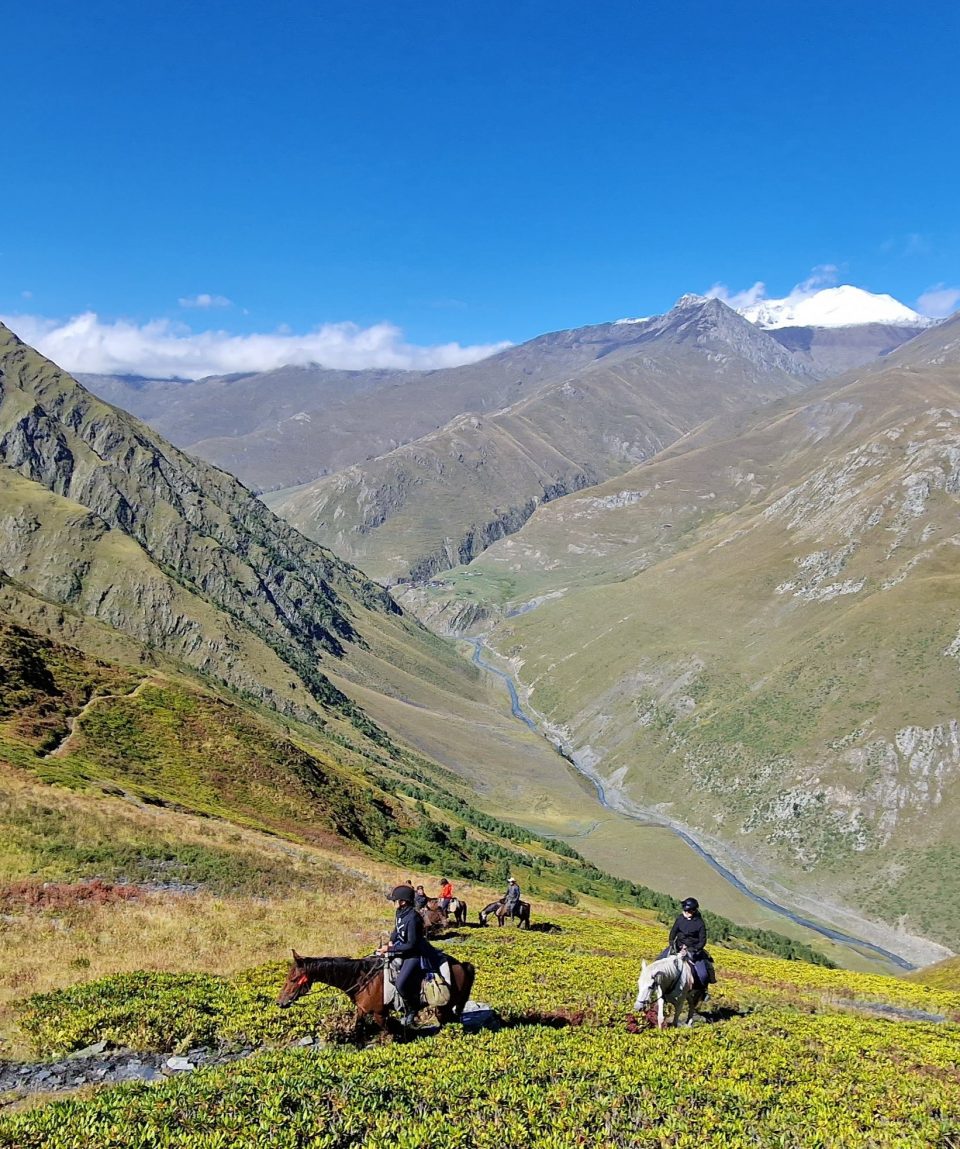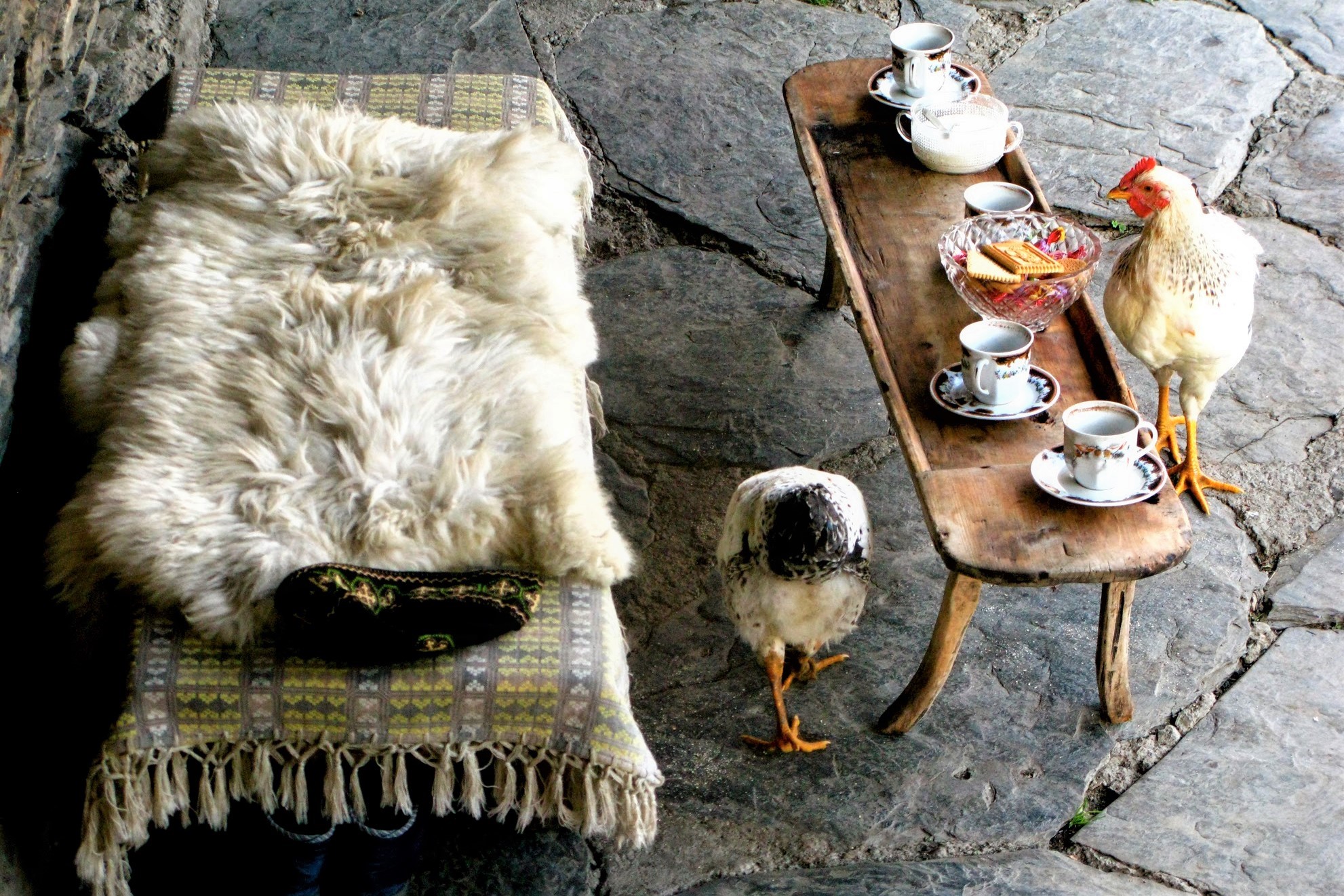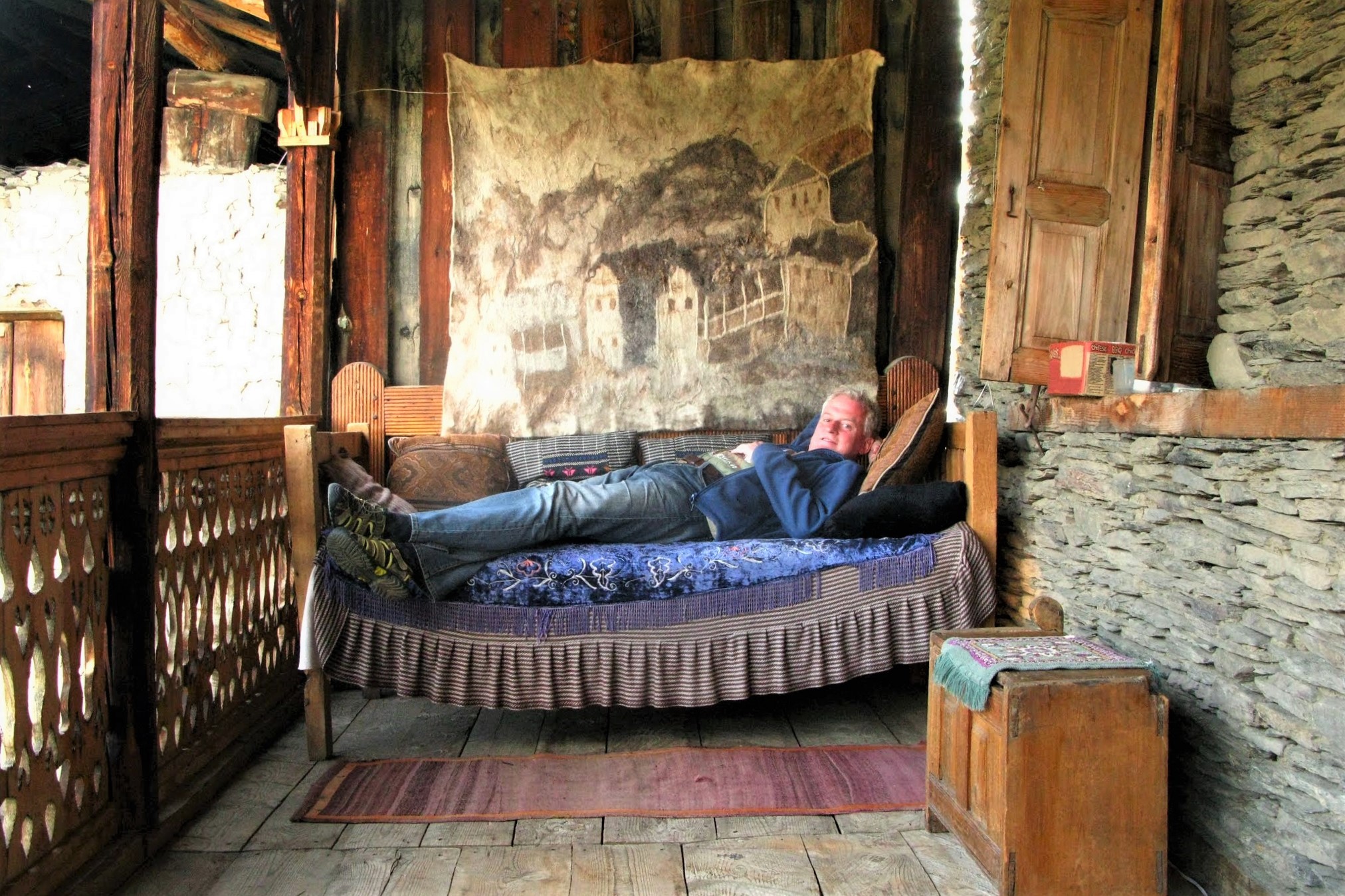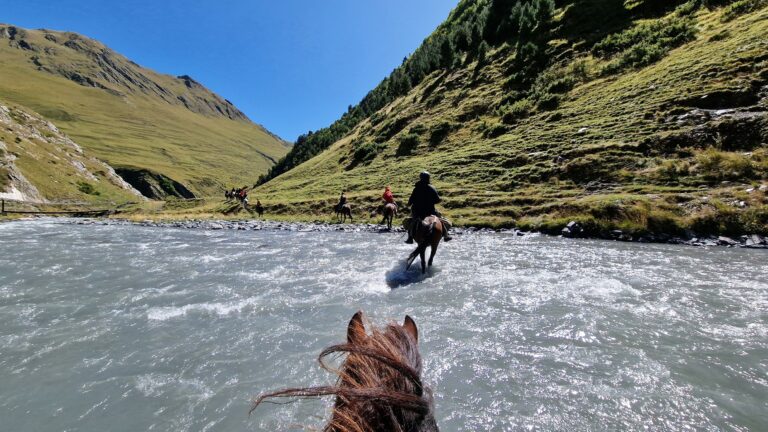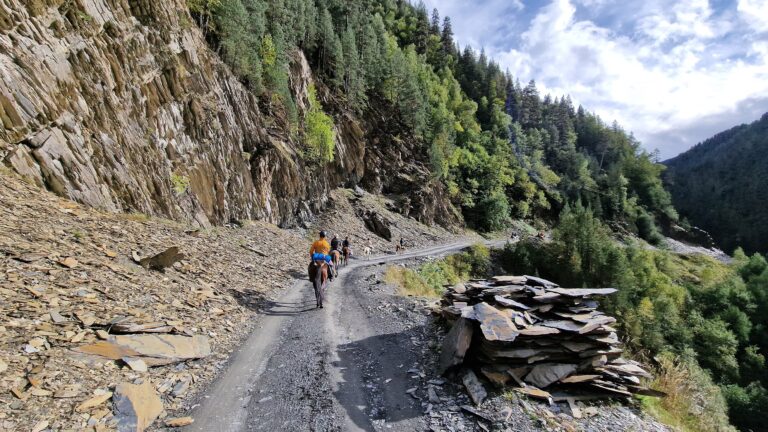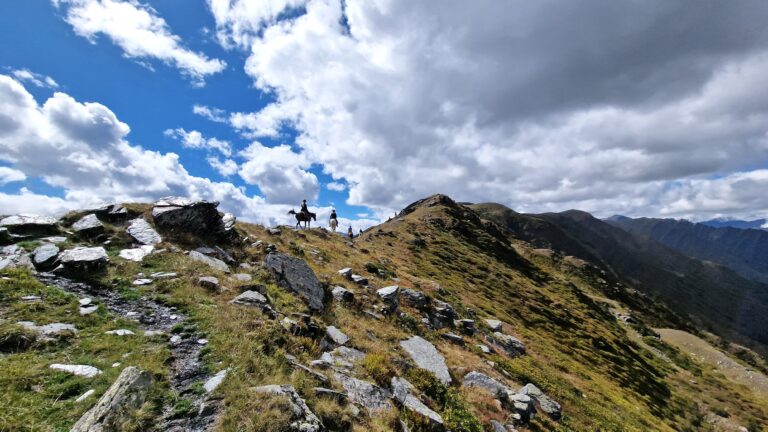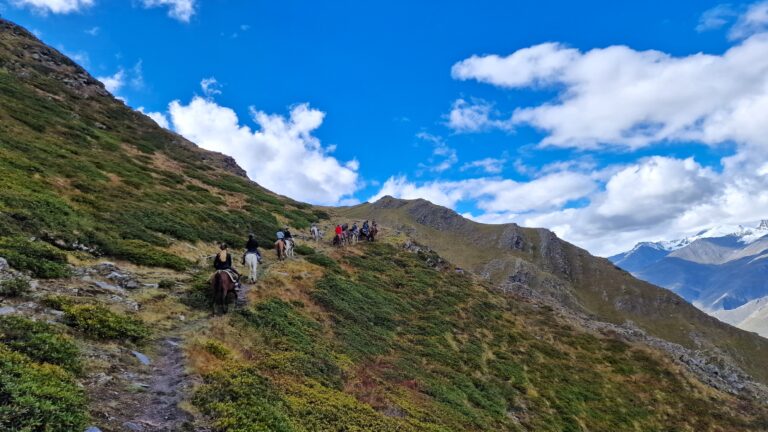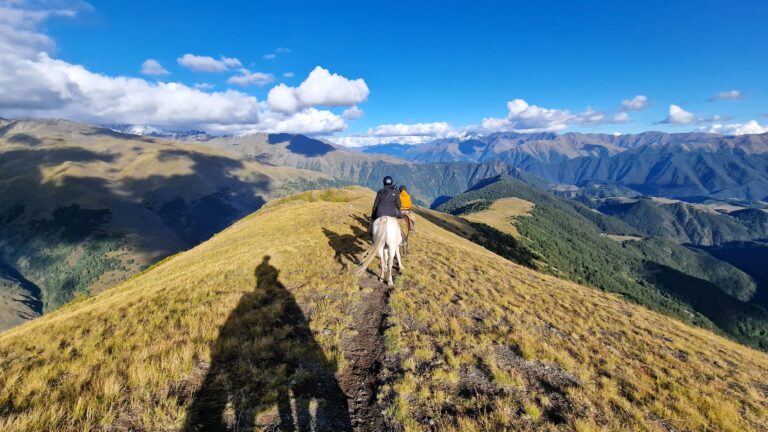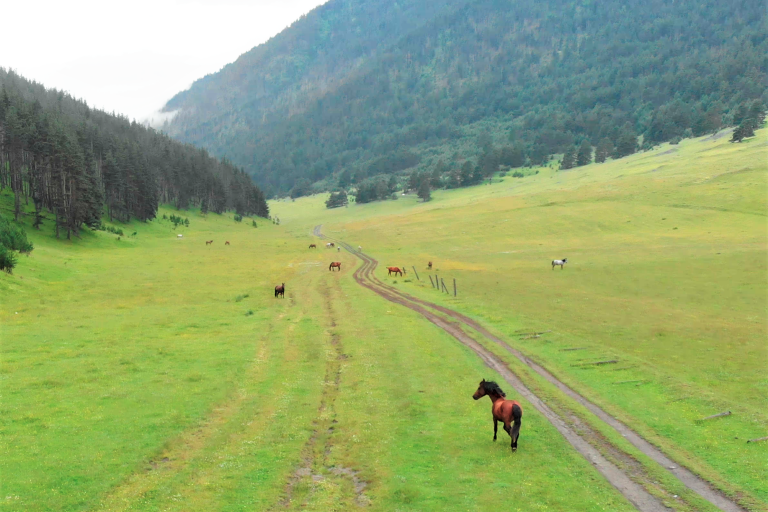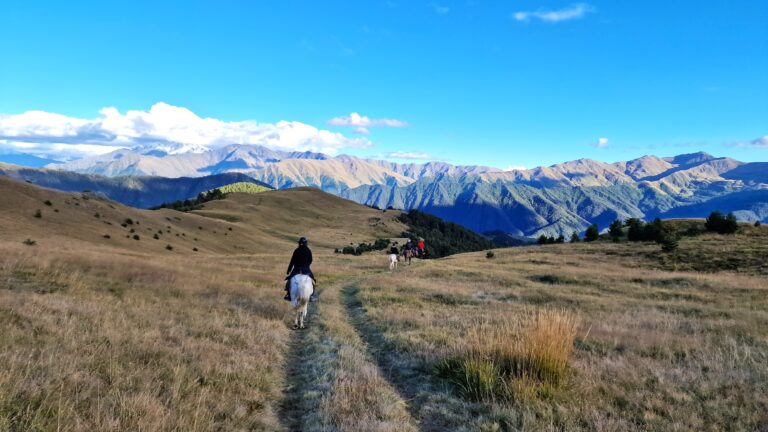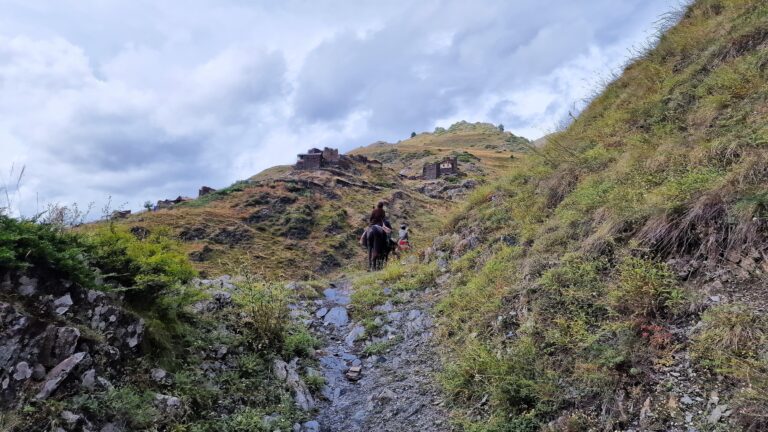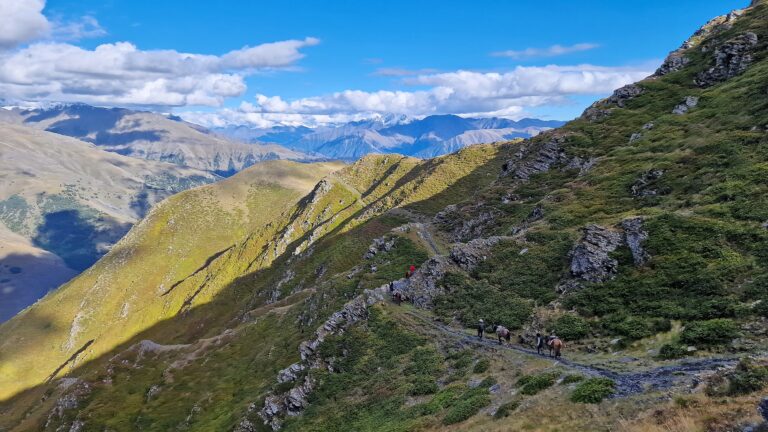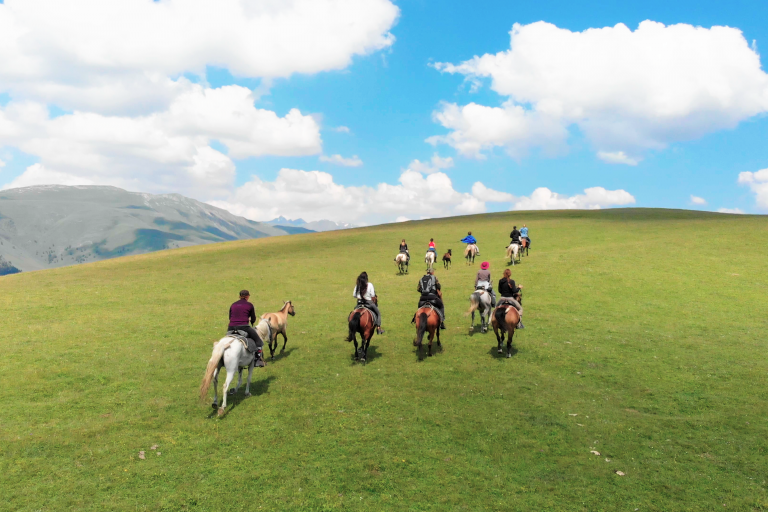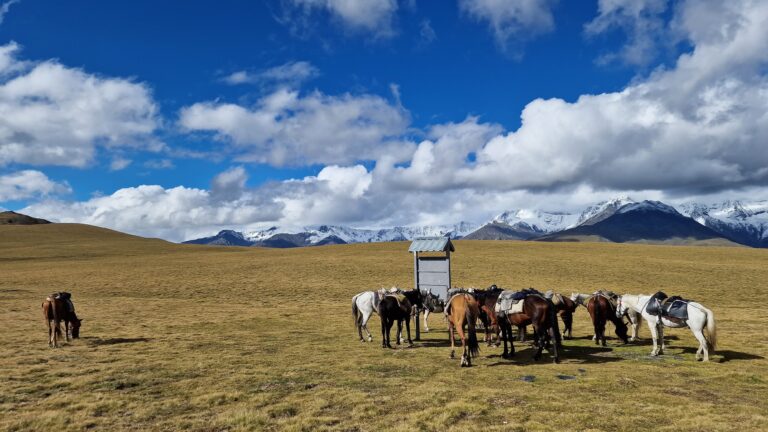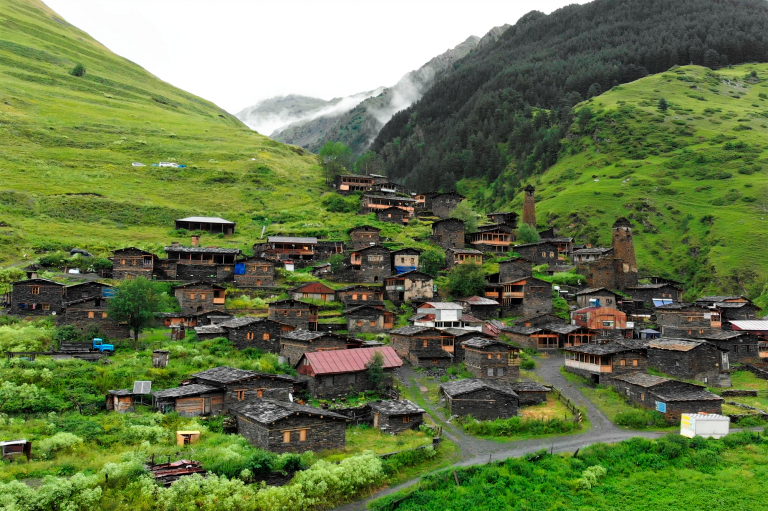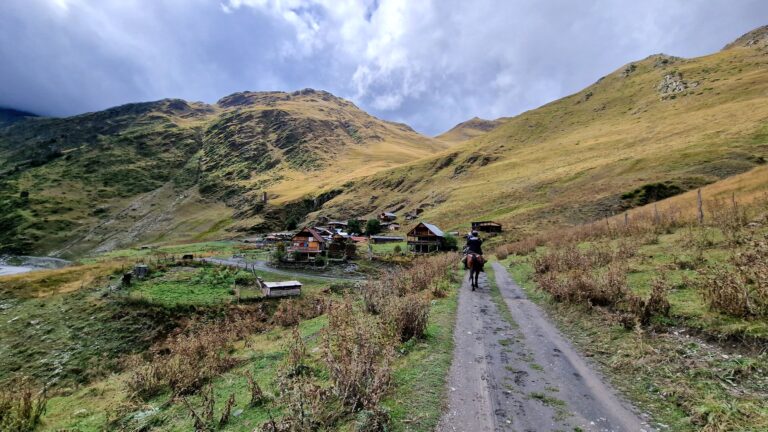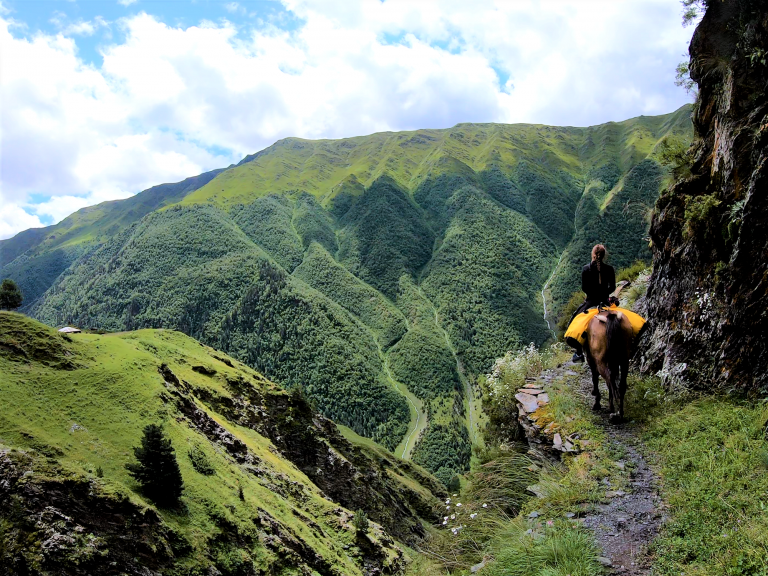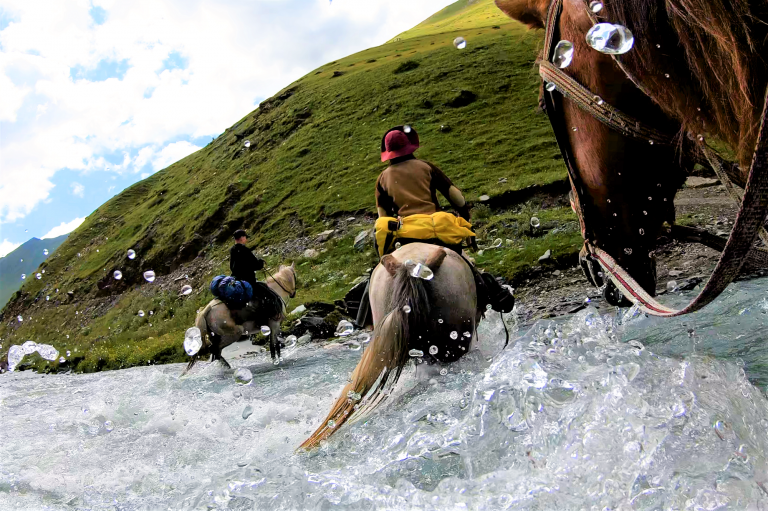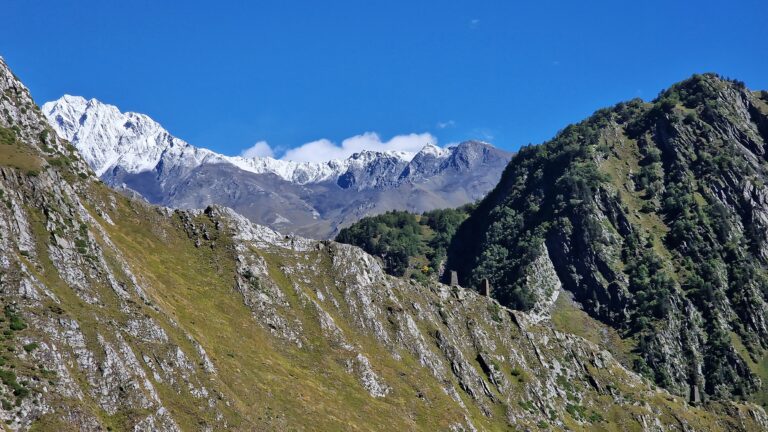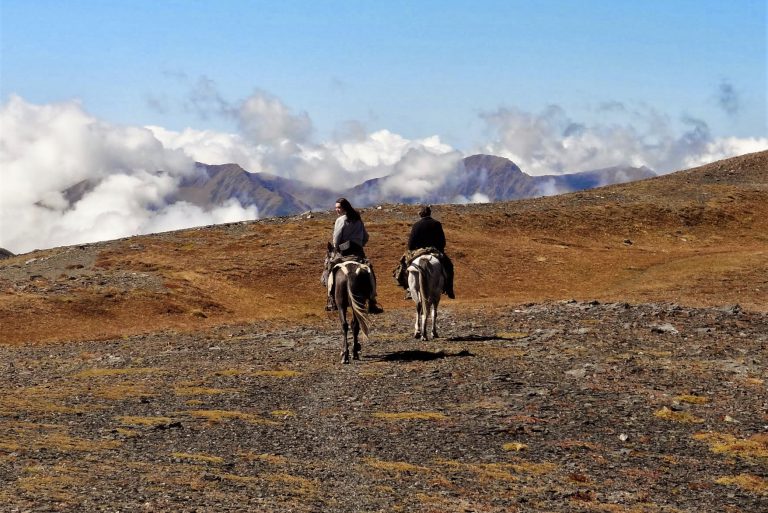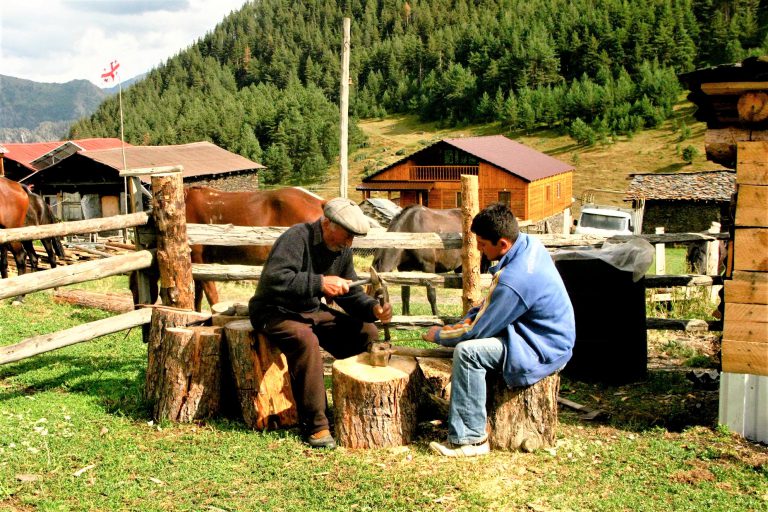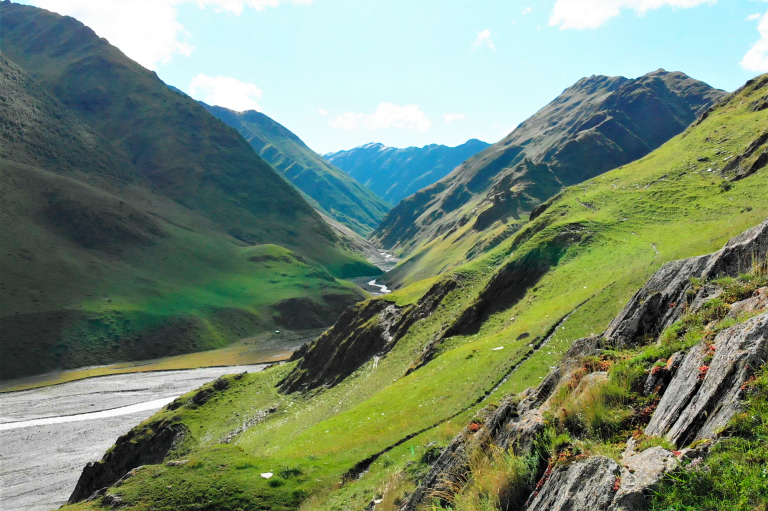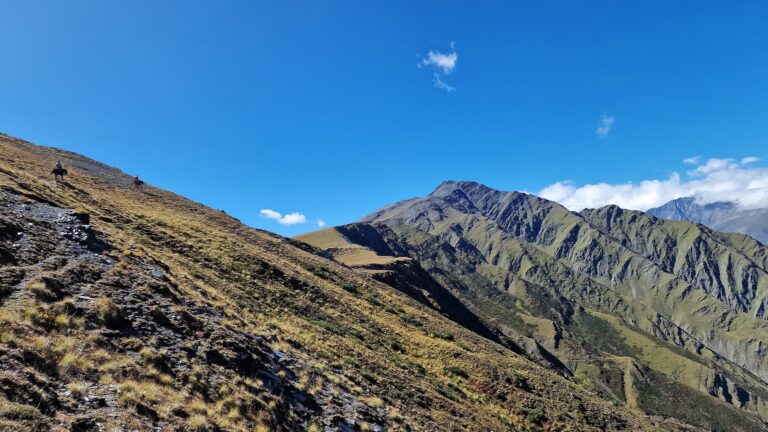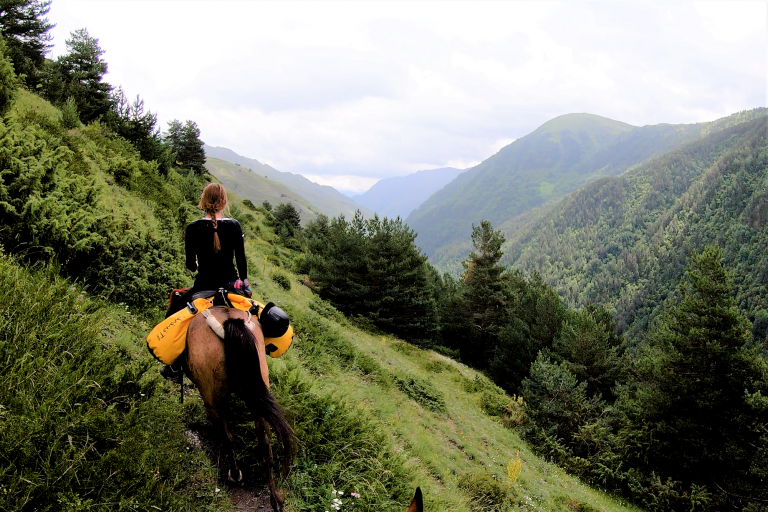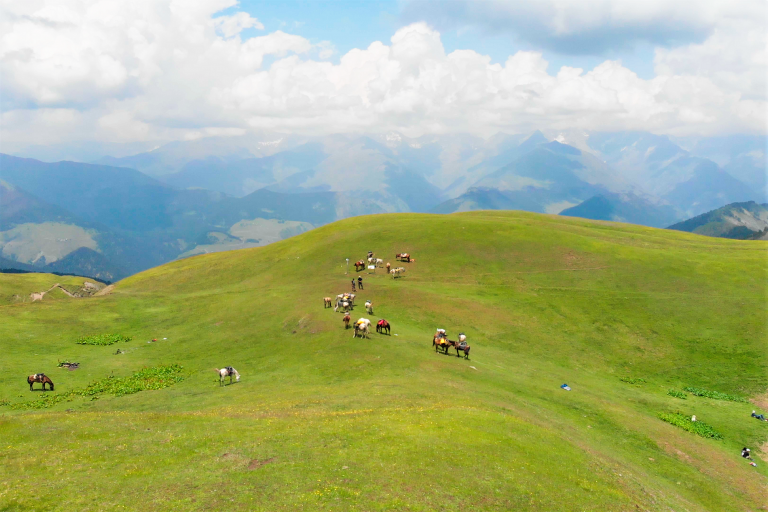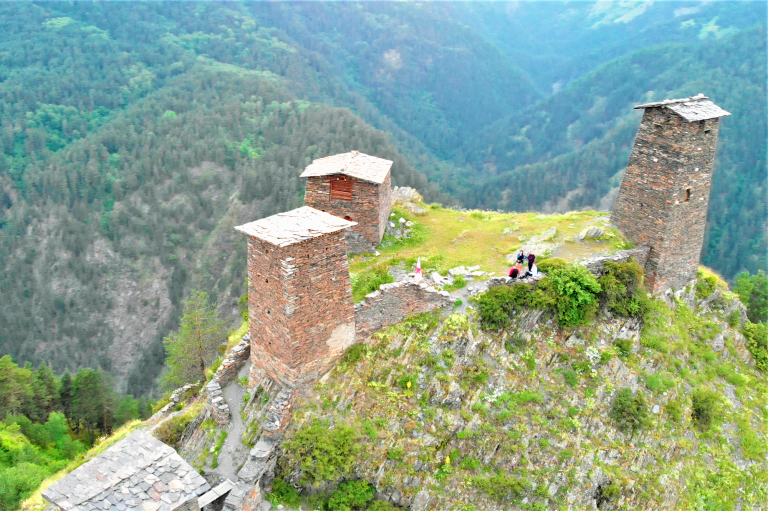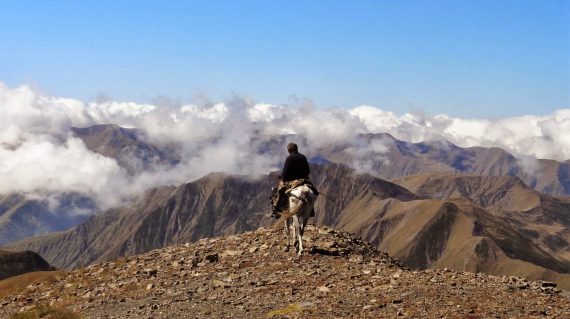
The Greater Caucasus
Georgia
Behold the majestic Caucasus! We are setting out for Tusheti, an amazing, absolutely beautiful, and legendary region of Georgia. The Greater Caucasus is one of our oldest and most important horse trails. This high mountain ride in wild, scarcely populated and stunningly beautiful Tusheti is a real adventure. We will climb steep paths and narrow shepherding trails right to high passes, ride out to mountain meadows, cross shimmering streams and reach small settlements deep in the Caucasus mountains. We will spend evenings and nights hosted by friendly highlander families, have long dinners together, drink chacha and wine, share stories and listen to the nature around us.
-
Days overall10 daysDays in saddle6 days
-
Group size12Available
-
Standardhighlanders' hospitality (under roofs and in beds)Luggageno limit, on horses: 12 kgFoodlocal cuisine, vegetarian available
-
Skillswalk, trot, canter
Our Greater Caucasus trail is quite an expedition through wild, remote, largely uninhabited Tusheti, a high mountain region in North-Eastern Georgia. It’s a unique expedition through wild, remote, largely uninhabited Tusheti, a high mountain region in North-Eastern Georgia. We spend 10 days in Georgia of which 6 days exploring this beautiful region on local Tushetian horses, a relatively small-framed, brave, tough and smart saddle horses that have been with Tushi highlanders since… forever. Their perfect balance, easy temper, endurance and experience makes them great horses for riding in this demanding, high mountain landscape. Hot water, electricity and mobile coverage might not be always available and the region stays largely pristine also being a national park and partially a protected nature reserve. We dash through wild mountains, climb high passes, ride ridges and descend to small settlements deep in the Caucasus mountains.
Tusheti is populated by highlanders, called Tushetians in English, or Tushebi / Tushi as they call themselves. Tusheti is scarcely populated, with less then a thousand people living there from late May to early October. From Spring to Autumn Tushis herd and raise thousands of animals, farm and… welcome guests, which is their favourite thing to do. Tushis, as all Georgians, love hosting guests. In cold months of the year the region empties with a dozen of people staying for Winter while the region is cut off from the rest of the world. The famous road to Tusheti disappears under snow and becomes nearly impassable until it reopens in late Spring.
Our Georgian team consists of highlanders, from both Tusheti and neighbouring regions, some of them nearly literally raised in the saddle. Their knowledge of Tusheti, vast experience in trail riding and famous Georgian hospitality makes them the best people for the adventure ahead and will give you a great insight into Tusheti and into the Georgian culture as a whole.
We spend most nights in relatively comfortable local guesthouses, in beds and linen, usually with hot water and electricity. Hosted by local families we get to see everyday life in Tusheti, taste local food and products and enjoy the simple and beautiful life high in the mountains of this unique region.
Everyday rides take about five hours. Due to the landscape this tour is moderately paced, with long climbs on horses but also great spots for fast canters. In some places, especially while going down steep or slippery slopes on some parts of the trail, riders dismount and lead their horses.
- 2 nights at a hotel in Tbilisi
- 7 nights at guesthouses in Tusheti
- All meals in Tusheti (brakfasts, lunches “to go”, dinners)
- Breakfasts in Tbilisi (one or two, depending on departure time flight)
- Two dinners at a restaurant in Tbilisi (first and penultimate evening)
- Transfers to and from Tbilisi airport (on first and last days of the tour) or bus station (for flights to and from Kutaisi)
- Transport from Tbilisi to Omalo and back
- Horsemen and guides during the entire ride in Tusheti
- English-speaking pilot during the entire tour
- Horse with full tack and equipment
- Luggage car in Tusheti
- Tourist insurance covering high-risk sports
- Flight tickets to and from Georgia
- Minor personal expenses (souvenirs, additional snacks, admission tickets, etc.)
- Optional: single room supplement (where available)
- Day 1 Welcome to Georgia
- Day 2 Road to Tusheti
- Day 3 On the trail
- Day 4 To the North
- Day 5 Foregone borderland
- Day 6 Greater Caucasus
- Day 7 Road through Tusheti
- Day 8 Reti lake
- Day 9 Back to Tbilisi
- Day 10 Farewell to Georgia

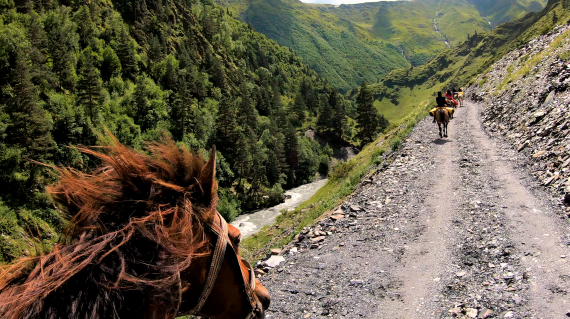
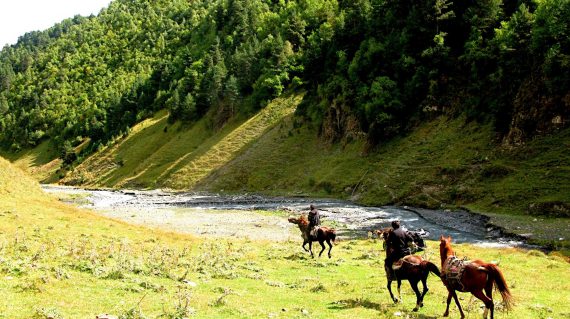
In Tbilisi, the group stays at a European standard family hotel. In Tusheti, however, we stay in guesthouses, hosted by local families. These places are modest but neat. We usually have access to running water, but it might not always be hot. Electricity is usually available. Sleeping bags and mats are not required for the tour – we always sleep under roofs, in beds and in clean bedding.
In Tbilisi, we eat breakfasts on the second and last day (depending on the time of your departure flight) at the hotel. For two dinners, on the first and penultimate day, we go to one of our favourite restaurants serving excellent Georgian cuisine. During all other days all food is provided. We have breakfasts and dinners at guest houses where we stay for nights. Lunches ride with us and are had during breaks.
Meals in Tusheti are traditional Georgian and local Tushetian cuisine, often typical of shepherds’ cuisine: mainly vegetables, lamb, and local cheeses in all their forms, along with bread and pastries. Drinks include—in addition to crystal-clear water—herbal teas, coffee, wine, and chacha (local moonshine).
Equipment
We use typical Caucasian saddles. They are quite different from the English and Western-style saddles and very comfortable for both horses and riders, especially for high mountain riding. Steel saddle bows are set on wooden benches. This construction is covered with a moderately soft “pillow” made of leather. The pillow is kept in its place by a strap, usually made of leather, which serves as a girth part at the same time. Tail docks are common.
Stirrup leathers in Georgia are quite short – Georgians practice a distinctive seat: legs in the front, knees high. Stirrups are quite simple and wide, allowing trekking shoes to fit inside well. Bridles are also simple, made the usual way. We use bits.
Caucasian / Georgian moutain saddles often raise interest, as they are different than classical, English or Western-style ones. Fairly unknown in the West these saddles are very comfortable for long and steep rides. Pommels and cantles are quite high to stabilize riders in mountainous terrain and the pillow seat absorbs bumps very well. This non-standard construction is also quite practical when it comes to attaching larger quantities of luggage.
What you should take with you
We leave our hard suitcases with all the belonging we don’t need for the trail at our base camp, where we start and finish our horseback riding tour. For the five-day loop and overnight stay in Shtrolta we repack into smaller, more manageable and luggage. For the duration of the ride we only take the things we need for that day. Side saddlebags for a jacket/raincoat and water are available on-site.
- passport
- cash, USD or EUR
- electronic devices, e.g. camera
- personal riding clothes, gear and equipment (helmet, chaps, gloves, pants, etc.)
- smaller luggage to repack your things for the 5-day loop and 1 night in Shtrolta
- a handy backpack or bag (for documents, phone, etc.)
- a canteen or other water containers (it might be an empty plastic bottle)
- flashlight; head flashlights are quite handy
- sunscreen
- head cover against the sun
- trekking shoes, waterproof ones advised
- raincoat / waterproof jacket
- flip-flops for showering
| Date | Trip Status | Price | Spots | |
|---|---|---|---|---|
23 June 2026 - 2 July 2026
|
Available, English-speaking guide/pilot |
1400 € |
6 |
|
27 August 2026 - 5 September 2026
|
Available, English-speaking guide/pilot |
1400 € |
1 |
|
22 September 2026 - 1 October 2026
|
Available, English-speaking guide/pilot |
1400 € |
12 |
